UPDATE | January 09, 2020
In Japan, international students can also work part-time and earn money within certain conditions. First of all, let's confirm the conditions and check points for working part-time here.
[New on January 8, 2019] Currently, about 75% of privately funded international students in Japan are living part-time. However, the original purpose is to study in Japan, so when international students work part-time, there are rules regarding working hours. Follow the rules and do as much as you can while studying in Japan. Participation in the school will be shortened due to part-time work, so that you will not be able to renew (new) your period of stay (the period during which you can live in Japan). Please note
table of contents
You may work part-time during your study abroad period, but you must do so within certain conditions.
1: Obtaining "permission for non-qualified activities" at the Immigration Bureau, etc.
2: Do not interfere with study
3: To supplement Tuition and necessary money for international students, not to save or send money
4: What is not customs business
5: It must be within 28 hours per week (within 8 hours per day during long holiday such as summer vacation)
6: Things to do while enrolled in an educational institution
Also make sure to pay careful attention to each item.
(1) "Permission to work outside the qualification" is valid even if you change your part-time job once you get it. However, there is an expiration date. It is the same period as your visa, so be sure to renew your non-qualified activities when renewing your visa. Also, please note that it takes about 2 weeks to 2 months before you apply for a non-qualified activity permit, so you can not work part-time immediately after applying.
The (4) customs business applies to sex shops, pachinko parlors, mahjong stores, game centers, dart bars, cabarets, host clubs, snacks, nightclubs, discos, pubs, and internet cafes. In these shops, you can not work even for dishwashing and cooking work other than serving customers. Similarly, you can't get flyers or tissue papers from these stores.
With regard to the limitation of working hours within 28 hours per week in (5), employers have recently become more troubled without knowing this upper limit. In most cases, the employer will be punished, but remember to protect yourself. The 28 hour limit is not for one part-time job. Note that if you are doing more than one part-time job, the total time will be the sum of the two part-time jobs. For long school holidays, such as summer and winter vacations, you can work up to 8 hours per day. However, there is another rule under the Labor Standards Law that a part-time job is no more than 40 hours in a week, so be careful not to exceed 40 hours.
Please note that you may be deported or fined if you are not active within these prescribed conditions.
[PR]
| Restaurant business | 45.7% |
|---|---|
| Sales and sales (convenience stores, etc.) | 26.3% |
| Teaching Assistant / Research Assistant | 6.9% |
| Translation interpretation | 6.8% |
| Language teacher | 6.5% |
| Less than 800 yen | 9.3% |
|---|---|
| From 800 yen or more to less than 1,000 yen | 50.1% |
| From 1,000 yen or more to less than 1,200 yen | 30.7% |
| From 1,200 yen or more to less than 1,400 yen | 4.4% |
| From 1,400 yen or more to less than 1,600 yen | 1.4% |
| From 1,600 yen or more to less than 1,800 yen | 0.4% |
| From 1,800 yen or more to less than 2,000 yen | 0.9% |
| Over 2,000 yen | 1.7% |
| unknown | 1.0% |
Source: Japan Student Services Organization, “2015 Survey of Privately-funded Foreign Student Life”
Jobs that make use of language skills have a relatively high hourly wage. However, the ability to understand high Japanese is required, and the number of applicants is small. There is a tendency for the food and beverage industry to be popular because they can get something to eat (a dish for those who work at the shop) and can eat it cheaply.
"Resume" is a piece of paper that describes your name and Street address, the schools and jobs you have attended, and the reasons for applying. Resumes can be purchased at convenience stores or stationery stores. When writing, write with a black ballpoint pen that does not disappear. It is a good idea to draft the content to be written on another piece of paper. When writing, write in Japanese.
There is always a place to put a photo on your resume. You cannot use photos with a peace sign, photos with faces hidden by sunglasses or hats, or snapshots. Use photos like those used for residence cards and passports. When taking photos, it is convenient to use ID cameras at stations, photo shops, and commercial facilities.
Resume sample
Click image to enlarge

There must be a statement of "permission" in the activity permission column outside the status of qualification on the back of the card.
You may be required to submit after the part-time job has been decided.
My Number is a 12-digit number written on the contact card sent from the city or ward office after you submit a “move-in notification” to the area where you live.
If you are not sure, ask a nearby government office or window to issue a “Resident's Card” with your My Number. When publishing, write the items you want to display, so check here for My Number. The issuance fee (money for the procedure) of 300 yen per copy is required, but you can find the number immediately.
You will be asked to submit after the part-time job is decided.
You need a passbook or card that shows the account number of a bank in Japan so that you can get a part-time job from your part-time job destination.
Before starting a part-time job, most interviews are done. You don't need to wear a suit when you are asked to come to the interview and you have no rules about dress. However, don't wear sandals, short pants, or clothes with lots of exposed skin, and try to wear clean-looking clothing. Pants and skirts other than shirts, blouses and jeans with a simple design are better. If you tie long hair, you will get a beautiful impression.
There are several ways to find a part-time job, but you can find it in the following way.
1: Talk to your current school teacher
2: Search over the Internet
3: Search by job information magazine / newspaper advertisement
4: Search for a part-time job recruitment leaflet posted at the store
5: Have the acquaintance introduce you
Once you have found the job offer you want to apply for (information about part-time job recruitment), let's listen in detail over the phone. It is smooth to let them know where you saw the job posting.
There are various companies and stores, and some of them are open to international students. At companies and stores that accept many international students, there are manuals written in simple words that are easy for everyone to understand, and you can start working with peace of mind if you have friends from the same country. Therefore, when you work part-time in Japan for the first time, such a company or store is recommended.
There are some points to check when choosing a part-time job.
If you haven't written for a recruiting website, book, or flyer, you may want to check directly at the interview.
Japan has a minimum salary determined by prefecture. Make sure that you are not below that amount, how much you are recruiting in the same area or job, and make sure you get the right hourly wage.
The most important thing for international students is studying. It's important to check if it's time to work the next day to study, and if you can change your shift to suit your school lesson schedule or exams.
Depending on the part-time job, the "trial period" and "training period" may be determined. Depending on the part-time job, during this period you may be paid a little less than the hourly rate stated on the job posting. It is a good idea to check this just in case.
Even part-time workers may be asked to work overtime. You will also be paid for this time, but you should check to see if you are too frequent or too long.
The break time is defined by the Labor Standards Law of Japan. If you work part-time, you are required to take a break of 45 minutes on the way if you work more than 6 hours, and 1 hour if you work more than 8 hours. You will not get paid during the break, so you will be paid for the time you actually work.
Make sure that you pay for transportation from your home to your part-time job. There is often a fixed upper limit per month, but the number of jobs available depends on whether you pay for transportation. If you do not pay for transportation, you will have to pay for transportation such as trains and buses to work part-time. If you start to work, please be careful not to say that the cost of transportation is too high to save you money.
Once you've decided on a part-time job, first check to see if you can get any work-related information in documents or notes. Or you may want to keep a printout of the website you were recruiting, or a flyer or job book. If you have a misunderstanding or trouble, it is very useful to have these items at hand.
When you start working, be especially careful about being late for time or absent from work. Japanese are said to be strict on time. Instead of arriving just at work, be sure to arrive early and start preparations so that you can work from that time. If you're going to be late, it's important to make a phone call when you know you're late, letting you know why and when you can arrive. In the same way, don't leave without absenteeism.
When starting a new job, even Japanese people are worried because there are many things they do not understand. If you don't understand, don't leave it as it is, ask other people to talk to you. First of all, make sure to greet each other in order to create a human relationship where you can easily ask questions.
In Japan, where languages and cultures are different, it is very difficult to work while learning the contents of work until you get used to it. However, working part-time in Japan will not only earn you money, but will also be an important experience for you as you develop your Japanese language skills and learn Japanese manners.

アクセス日本留学Editorial Department.アクセス日本留学" where foreign students can request materials to find Japanese schools, and hold "advancement information sessions for foreign students".
[PR]
[PR]